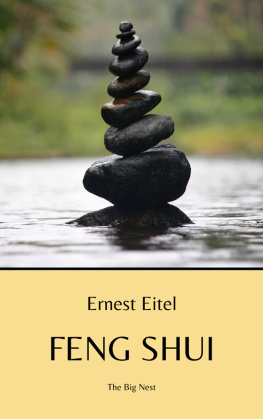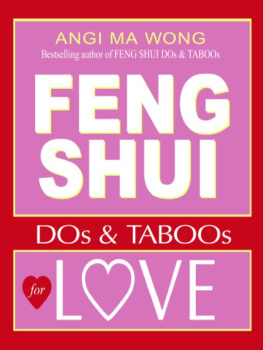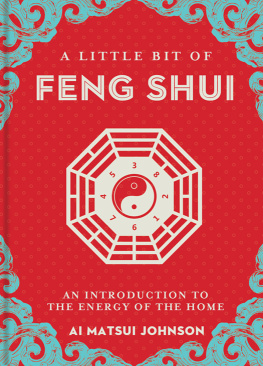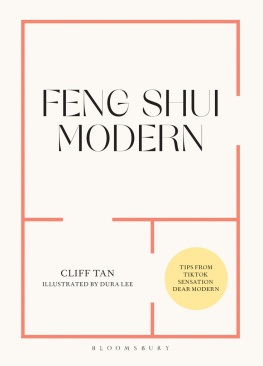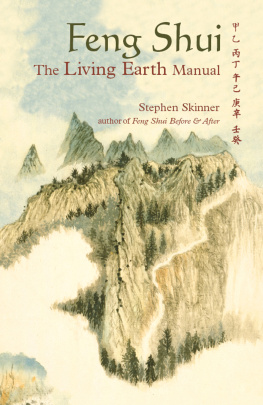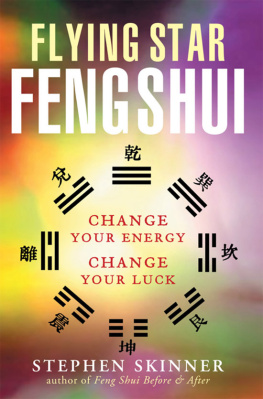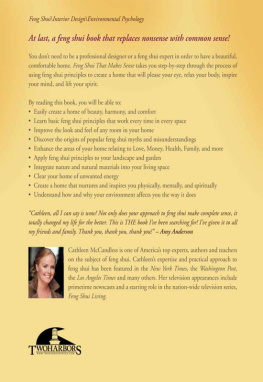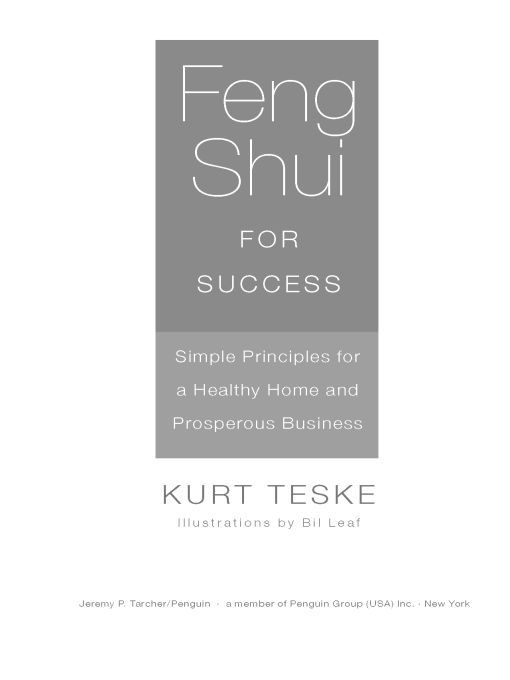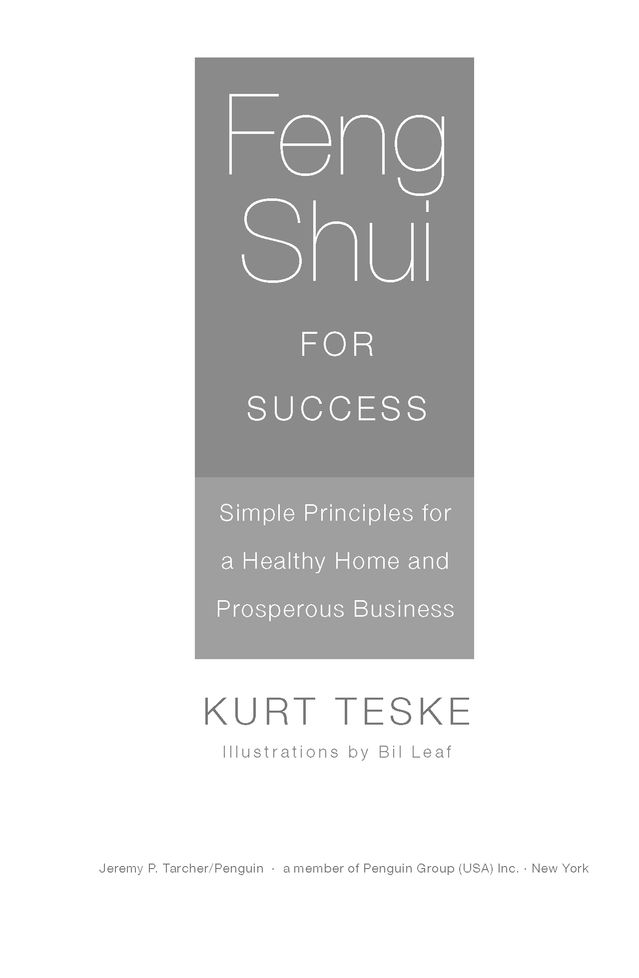Table of Contents
INTRODUCTION
Mention the Chinese words feng shui among friends these days, and theres a good chance at least a few have heard of it. Some might even claim to know what it is, something like moving the sofa or placing a funny-shaped mirror on the wall so the universe will then put a Mercedes-Benz on their doorstep. However, its much moreits a proven and practical way to enhance life by creating harmony, balance, and vitality in our surroundings. It is a practical application of Taoism, one of the oldest and most long-lasting spiritual traditions on earth.
Tao (pronounced dow) is often translated as way or path. In one sentence, Tao is the intuitive search for reality, as well as that ultimate reality itself, and is distinguished by finding harmony in what appear to be opposites. China, with one of the worlds oldest and most stable cultures, provided fertile ground for this path to evolve over many thousands of years. (The Chinese have had the time and peace to develop a thorough system, but just about every other native tradition has its own system of environmental energetics, oras feng shui is often called in Europegeomancy.) Feng shui is one of Taoisms most useful practices, with the power to invigorate the outer world in the same way that other Taoist work, such as acupuncture, tai chi, and shiatsu, can help the inner world. And because feng shuis principles are ageless, they adapt to any culture. This helps explain why it has recently gained a strong following in Europe and North America. Moreover, it meets the most important criterion of any healthful environmental practice: It works.
Feng shui can create environmental harmony with versatility, depth, and creativity, and affect our lives in many useful ways. We may use feng shui to realize any number of personal and communal goals, from the most mundane to the most universal, including:
Making our home/office/personal environment more useful, happy, and revitalizing
Clearing away clutter, blockages, and personal pitfalls in our spaces
Giving us more vital energy to accomplish our goals
Integrating our material goods and property more effectively into our larger lives
Increasing the effectiveness, and thus the success, of our businesses
Developing a strong, abiding intuition that senses new or hidden trends and forces
Making us more attuned and sensitive to our environments, both local and global (feng shui was green millennia before the economy made going green so fashionable)
Helping us understand the nature of the world and how to naturally be ourselves in it
Tao and Success
Beyond these specific achievements, feng shui can help us navigate our complete life path harmoniously and wisely. As Wen-Tzu, one of the early Taoist masters, wrote, Personal success has nothing to do with ordering others, but is a matter of ordering oneself. Nobility has nothing to do with power and rank, but is a matter of self-realization. Attain self-realization and the whole world is found in the self. Happiness has nothing to do with outward wealth and status, but is a matter of inner harmony (Wen-Tzu, Verse 4). So can feng shui really help us find this harmony at the root of success? Absolutely! Even though feng shui may seem to be only a branch of Taoism, it is a path where the part can lead to the benefits of the whole. While some of our goals will be reached in such an organic, easy way that the process will seem like magic, a real payment must be made through disciplined practice and focused hard work. At the same time, our own efforts arent enough; we must be open to what the world gives usand that interaction can be truly mind-changing. This movement and rest is yet another aspect of Tao. For those of us with an accepting attitude toward the world, finding harmony with Tao is a fine goal for ones life. Others of us may ask, Isnt there more to it than that? Then why not consider a marvelous question posed by Charles Dickens, once the worlds most popular storyteller, in his own favorite novel, David Copperfield: What is necessary for you to become the hero of your own life? What better way to ask what it would take for our noblest goals and aspirations to become reality! Since many of us, and probably most when fully honest, do desire many of the material pleasures of life, lets look a bit more into the connection between inner harmony and outward comfort.
Feng Shui and Prosperity
We make a living by what we get. We make a life by what we give.
WINSTON CHURCHILL
Can we, and should we, use what began as a spiritual discipline to gain prosperity? Yes, if we sincerely grapple with three questions: What does prosperity mean
for me? What do I owe in return for my prosperity? Where does money fit into all this? These are highly personal questions in which coming up with an answer is not as important as engaging in real self-reflection. Practicing feng shui is a two-way street; by working with our environment we also work on ourselves. We shouldnt mechanically follow this or that rule just because someone once said it was a rule. Rather, when we learn how our surroundings are interwoven with our lives, and discover what outer change can and cannot do, we also realize the state of our inner life and where we wish to go. The following short meditations can help us answer these three questions at the necessary level, that of our true self or essential being:
What does prosperity mean for me? A pervasive clich floating through some cultures holds that there is an unavoidable trade-off between wisdom and wealth, personal evolution and accumulation of resources, seeking the sacred and piling up cash. This idea has been expressed as: Material poverty means spiritual riches, material riches mean spiritual poverty. For most people this is nonsense. Destitution necessarily confers neither nobility nor insight. Some of the most venal, malicious and destructive people have been dirt-poorlook at many of Flannery OConnors short stories about the greed and corruption of the poverty-stricken. Yes, someone can choose a path, like Saint Francis of Assisi, who felt it was necessary as a traveling priest living on charity to have no material possessions to encumber his work. On the other hand, individuals with great resourcesfrom the emperors Ashoka (in India) and Antoninus (in Rome) to Andrew Carnegie and Bill Gates, to name but a fewhave helped the poor, built schools and hospitals, fostered research, improved cities, and patronized the arts. The world is surely a better place because of them. Answering the prosperity question means finally asking ourselves, What do we really want? What do we already have in our life, and what are we doing with it? Feng shui really does begin at home.
What are the obligations of prosperity? Most of us have many things in our lives for which to be thankful, while there are more than a billion people who are struggling every day and dont even have enough to eat. Isnt it selfish to seek additional prosperity for ourselves? Shouldnt we help our city, so hundreds or thousands have better lives? Shouldnt we help our country, so millions are more prosperous? Shouldnt we think of helping the planet first, so billions will be better off? Well, how does one get started in such widening circles of social consciousness and charitable action? Again, everything begins right here, with the cultivation of a virtuous self. Mahayana Buddhists vow to liberate every sentient being in the cosmos, but they must start with waking up themselves. Jesus of Nazareth said, (Matthew 7:4-5, RSV) How can you say to your brother, Let me take the speck out of your eye, when all the time there is a plank in your own? You hypocrite, first take the plank out of your own eye, and then you will see clearly to take the speck out of your brothers. Therefore, the inner work must always precede the outer. How can we make good with the wealth we have? Make ourselves Good.


